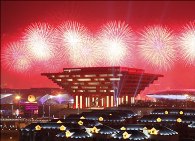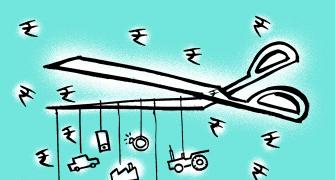 The spectacular opening ceremony for the Shanghai World Expo on April 30 would have surprised no one.
The spectacular opening ceremony for the Shanghai World Expo on April 30 would have surprised no one.
As the 2008 Beijing Olympics demonstrated, China favours the "shock and awe" philosophy when it puts itself on international display.
Still, even by its own ultra-competitive standards, China may well find the Shanghai Expo extravaganza a case of overkill and, maybe, hubris. Consider, first, the numbers.
At a stunning $46 billion - more than the cost of cleaning up Beijing ahead of the Olympics - the Shanghai Expo is the most expensive industrial fair in the history of world fairs; it is also the world's largest expo site, covering almost 6 sq km, and is expected to attract the highest number of visitors at 70 to 100 million over its six-month duration.
To Indian industrialists struggling for years together to acquire land for projects, it may be a point of envy to note that the city administration was able to shift 18,000 families and 270 factories to make way for the expo ground along either side of the Huangpu river.
The purpose of all this: to brand Shanghai as the great "world city" of the 21st century. This is not a unique ambition, of course.
Ever since the landmark "Great Exhibition of the Works of Industry of All Nations" in the UK in 1851 - at the height of the industrial revolution - expos have been held to demonstrate the industrial power of nations and China is well within its rights to do so as the world's third-largest economy.
What exactly are the spin-off advantages from this high-cost spectacle? The immediate and obvious benefits are visible in the better civic amenities that a city acquires in readiness for the expo (as Delhiites discovered during the Asian Games and now the Commonwealth Games).
As for the hard-nosed commercial benefits, the jury is still out on that one. It is worth noting that ever since the Hannover Expo in 2000, which attracted considerable attention because of the high spends on national pavilions, some governments have become sceptical about the cost-benefit equation attached to such fairs.
Even assuming that the Chinese government is eyeing the expo as nothing but a mega-brand-building exercise, it is still worth wondering whether it makes sense to spend an eye-popping 1 per cent of gross domestic product to trumpet a triumphalist message that the world already pretty much acknowledges.
Indeed, the city's administration has already created a spectacular urban landscape that attracts global admiration and investment - the Pudong reclamation, the metro, the bullet train connections are all monuments to Shanghai's emergence from the ennui of the communist era.
Now, reports suggest that the government has raised huge amounts of debt that it might struggle to repay going forward. This is not such an unlikely situation either: like the rest of the world, Shanghai is suffering a real estate glut, visible in swathes of empty skyscrapers around the city.
Real estate values are likely to fall further once more stock is freed up from the expo and comes on the market after November which will certainly constrict the city government's revenue options.
All of which could mean that visitors to the Shanghai Expo will - inevitably - be overwhelmed, but the country may be paying the price of this pomp and circumstance for several years to come.








